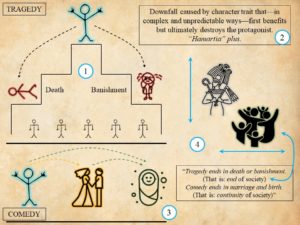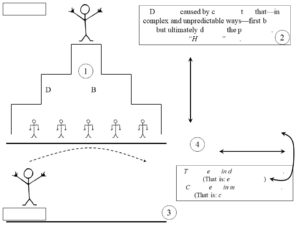The “10-minute rule” offers teachers practical guidance. It typically sounds something like this:
If students aren’t intrinsically interested in material, they can pay attention to it for no more than 10 minutes.
Ergo: teachers should do something different every ten minutes.
Ergo: the lecture is dead.
I first heard the “10-minute rule” at a conference in 2008, and run across it frequently when I work with teachers. They too, it seems, heard it at a conference.
Any rule that gets so much love at teaching conferences must be true, right?
Research-Aligned Teaching Advice
If you’re reading this blog, you want your teaching to have research behind it. So, what exactly is the research behind the “10-minute rule?”
Neil Bradbury is glad you asked. He looked into its history, and came up with some astonishing results: results that would be funny if they weren’t so alarming.
Let’s start with a Johnstone and Percival study from 1976, where two researchers visited 90 lecture classes (!). By comparing observations, they agreed that attention started to wane within the first five minutes (!!), with another decrease in the 10-18 minute range (!!!).
As Bradbury reports, however, this conclusion gets murky quickly:
First: they visited only 13% of those lectures together. In other words: 87% of their data come from one lone observer.
Second: they don’t report how they measured attention, or — for that matter — lapses in attention.
That student looking out the window: is she distracted by a bird, or concentrating on the professor’s complex argument?
That student looking keenly at the slides: is he engrossed in the topic, or trying to remember his lines for tonight’s rehearsal?
Johnstone and Percival have no way to know.
In other words: the “10-minute rule” rests on the hunchy sense of two visitors who were — as far as we can tell — simply relying on their guts. Whatever we call that, we don’t call it “research.”
And, whatever we do with their hunches, we shouldn’t change our teaching because of them.
Measuring Attention
This study highlights a complex problem. Attention, of course, takes place inside our heads. How can we measure it?
One solution: keep track of students’ note taking. Perhaps, students take more notes when they pay attention, and fewer notes when they don’t?
If that hypothesis is true, then students who write less are paying less attention. When we find a steep decline in note taking, we’ve found the moment when attention has dropped off. Sure enough: a 10-minute increment turns out to be crucial.
Alas, as Bradbury points out, this approach also collapses.
First: students take notes relatively consistently throughout a lecture. Their note taking falls off in the final ten minutes, not after the first ten minutes.
Second: in fact, the quantity of note taking results from the professor’s lecture, not from the point in the lecture. When the speaker makes key points, students write more. When the professor is recapping, or simply winding down — as she might do at the end of a lecture — they take fewer notes.
As Bradbury pithily summarizes this approach:
Note taking is not a good proxy for attention whatsoever, and even it if were, it does not support a 10- to 15- minute limit on student engagement.
BOOM.
Let’s Get Physical
If note-taking doesn’t measure attention, perhaps we can use biological measures instead.
Research by Bligh used a pulsemeter to measure students’ alertness. This study found that their pulses dropped roughly 14% over the course of the class.
At last: research confirmation of the “10-minute rule”?
Alas, Bligh’s research found the same results during a discussion class as during a lecture.
We might think that a lower pulse suggests less attention. If it does, then neither class format sustains attention.
Classroom Implications
In brief, the “10-minute rule” isn’t a rule, and doesn’t last ten minutes.
More precisely: we have no research suggesting it’s a rule with a consistent time limit.
Given that truth, what should we teachers do?
First: focus on the obvious truth that people are different.
Older students can (probably) pay attention longer than younger ones.
Hungry students (probably) pay less attention than less-hungry ones. (Except right after lunch.)
Some cultures prioritize focused attention more than others.
Some lecturers know how to hold an audience better than others.
Your approach to teaching should vary based on your specific circumstances, not be dictated by an arbitrary rule (which sounds authoritative but has no research backing.)
For instance: I’m currently teaching two sections of the same class — one in person and the other online. I teach them differently because attention can be more difficult online. (And because the online section meets earlier in the day — a real challenge for high school students.)
Second: study the science of attention.
Surprisingly, attention isn’t one thing.
Instead, attention is a behavioral combination of three distinct mental processes.
The more teachers understand that complex mix, the more successful we can be in creating the behavior by managing the mental processes.
I’ve written a book on this subject: Learning Begins: A Classroom Teacher’s Guide to Working Memory and Attention. (Ryan Reynolds will play me in the movie, I’m sure.)
Or, you can read LOTS of great articles: here’s one place to start.
Whichever approach you take, don’t let implausible absolute rules shape your thinking. Pay attention to your students, and to attention itself. Those two beacons will guide you on your classroom journey.
In the past, I’ve cited Wilson and Korn’s 2007 discussion of this topic. My thanks to Zach Groshell (Twitter handle: @MrZachG) for pointing to Bradbury’s wonderful article.
 About Andrew Watson
About Andrew Watson 








![Prior Knowledge: Building the Right Floor [Updated]](https://www.learningandthebrain.com/blog/wp-content/uploads/2019/10/AdobeStock_227486358_Credit-1024x631.jpg)












